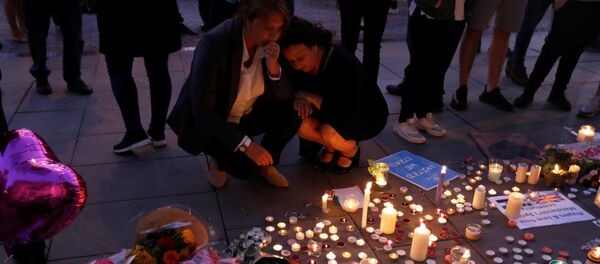Digital and social media platforms have been accused of facilitating and promoting radicalization propaganda after it emerged extremist videos on YouTube could be viewed alongside paid for banner adverts.
READ MORE: The Mod Squad: YouTube to Protect Kids With Army of Content Moderators
The company was forced to publicly apologize after a number of high profile companies withdrew their advertising contracts with the Internet giant.
Why are companies apologising for putting adverts/promos in national newspapers? Far more offensive to have your advert served next to an extremist video on YouTube. https://t.co/NjhAcgxNhP
— Tom Bristow (@TomSBristow) December 4, 2017
Dr. Gilbert Ramsay told Sputnik the recruitment of 10,000 people isn't necessarily the right solution.
"If you are on the way to being radicalized watching beheading videos may play a part in your radicalization — but to the average person, it's not going to do that. The most horrendous content shouldn't be accessible. It's not hard to argue a gruesome beheading video, should be available to watch. The problem isn't content, it's about context."
Bad Actors
Susan Wojcicki, chief executive of YouTube said: "bad actors are exploiting YouTube to mislead, manipulate, harass or even harm. We will continue the growth of our teams, with the goal of bringing the total number of people across Google working to address content that might violate our policies to over 10,000 in 2018."
YouTube has already said it has terminated 50 channels and removed thousands of videos and advertisements from 500,000 exploitative videos.
"This stuff is so contextual, content providers regulating it at speed is the wrong approach. We're often told the internet is a phenomenon where radicalization is rapid and unpredictable; but actually it's remarkable how rare it is for people carrying out the attacks, not to be on the intelligence radar," Dr. Ramsay told Sputnik.
Manchester bomber, Salman Abedi was first actively investigated in January 2014. He was thought to be acting suspiciously with another person who was a 'subject of interest' for MI5. It transpired that this person wasn't Salman Abedi. Six months later, MI5 closed its file on him.
— Dr. Rizwaan Sabir (@RizwaanSabir) December 5, 2017
Dr. Ramsay's comments follow the recent revelation the Manchester suicide bomber Salman Abedi had twice been a "subject of interest" in MI5 investigations before the attack took place in May 2017. Fresh intelligence had been received on Abedi in the months leading up to the attack which killed 23 people but its "significance was not fully appreciated at the time."
Who's to Blame?
Earlier this year Facebook announced it would hire around 4,000 more staff to address extremist content. However, Dr. Ramsay believes there needs to be a more "holistic" approach to tackling online radicalization and suggests targeting Internet giants isn't the answer.
"The Internet plays a role, social networks are crucial, but you need a holistic understanding of the issue — radicalization happens in a broader context. There is a tendency for governments to blame their own failures on companies like YouTube."
The academic believes it is a "convenient source of blame," but instead UK PM Theresa May should be more aggressive in pursuing tax avoidance and use the funds to build a "more holistic response to radicalization than her current aggressive stance towards content providers."
"Extremists can mean a lot of different groups and ideologies. The problem is it's always difficult to define what exactly extremist content is," Dr. Ramsay concluded.



